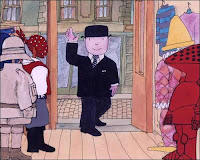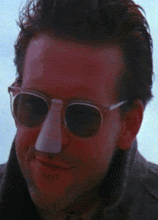
Cloverfield is an object-lesson in how to revitalise an established genre. It's a monster movie, but the genre is presented from a different point of view, as if we are looking in from the outside. It is also the movie which reveals how 9/11 taught Hollywood how to do disaster. According to Slavoj Zizek, in his instant response to the catastrophe, 'The Desert of the Real', one of the striking things about the media coverage of 9/11 is how it showed that we had been 'prepared for' the event by movies depicting the destruction of US cities such as Escape From New York and Independence Day. But Cloverfield shows that there is a parallel knock-on effect. Want to know how people react in the face of a crisis? Replicate the real footage of people running in panic around the streets of New York. Need to detail the moment when it's suddenly clear nothing will ever be the same again? Replicate the home video inadvertently capturing the moment tragedy strikes. Equipping the cultural imagination (see also 2006's Right At Your Door) with the ability to depict disaster with supreme accuracy is one of the clear consequences of 9/11.


